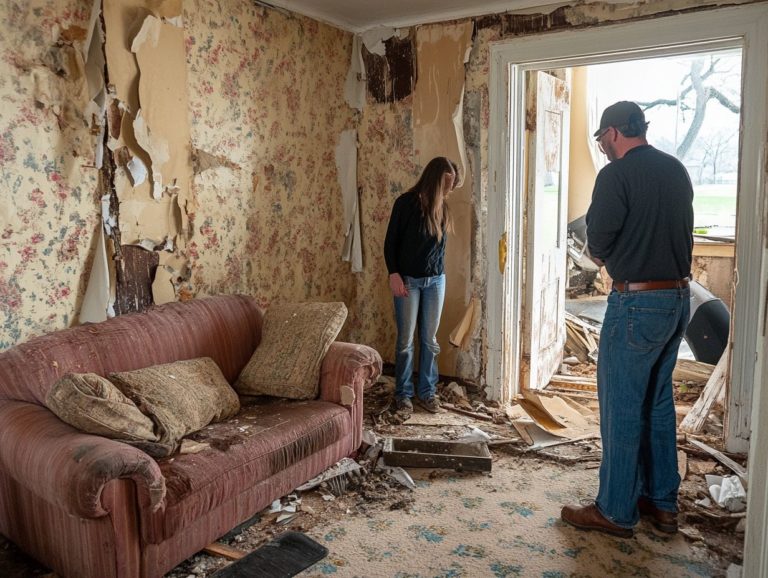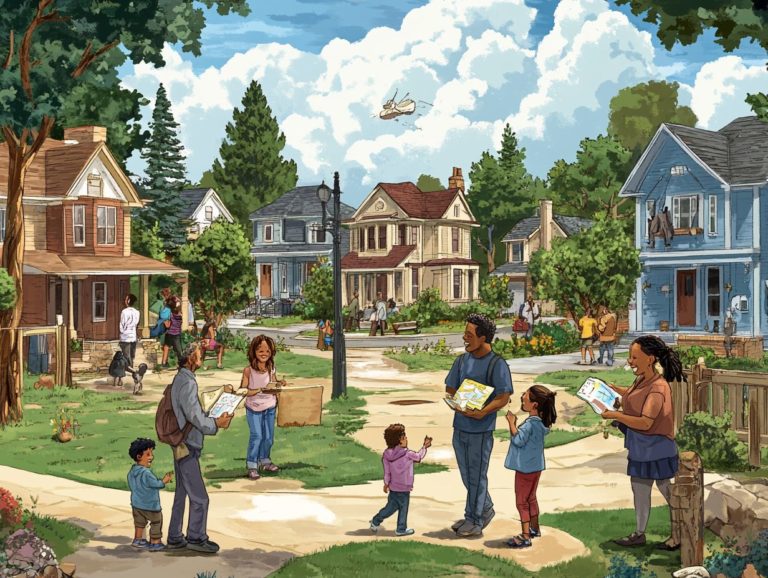How to Choose the Right Neighborhood?
Choosing the right neighborhood is about creating a lifestyle that fits your unique needs and preferences. This guide covers the important factors to consider, including location, safety, school quality, and community amenities.
You ll find useful tips for researching neighborhoods and insightful questions to ask locals and real estate professionals. By the end, you ll know how to evaluate and select a neighborhood that feels like home.
Contents
- Key Takeaways:
- Factors to Consider When Choosing a Neighborhood
- School Districts and Education Opportunities
- Community Amenities and Services
- Researching Potential Neighborhoods
- Online Resources and Local Information
- Visiting and Exploring Neighborhoods
- Questions to Ask When Evaluating a Neighborhood
- It’s Time to Make Your Final Decision!
Key Takeaways:
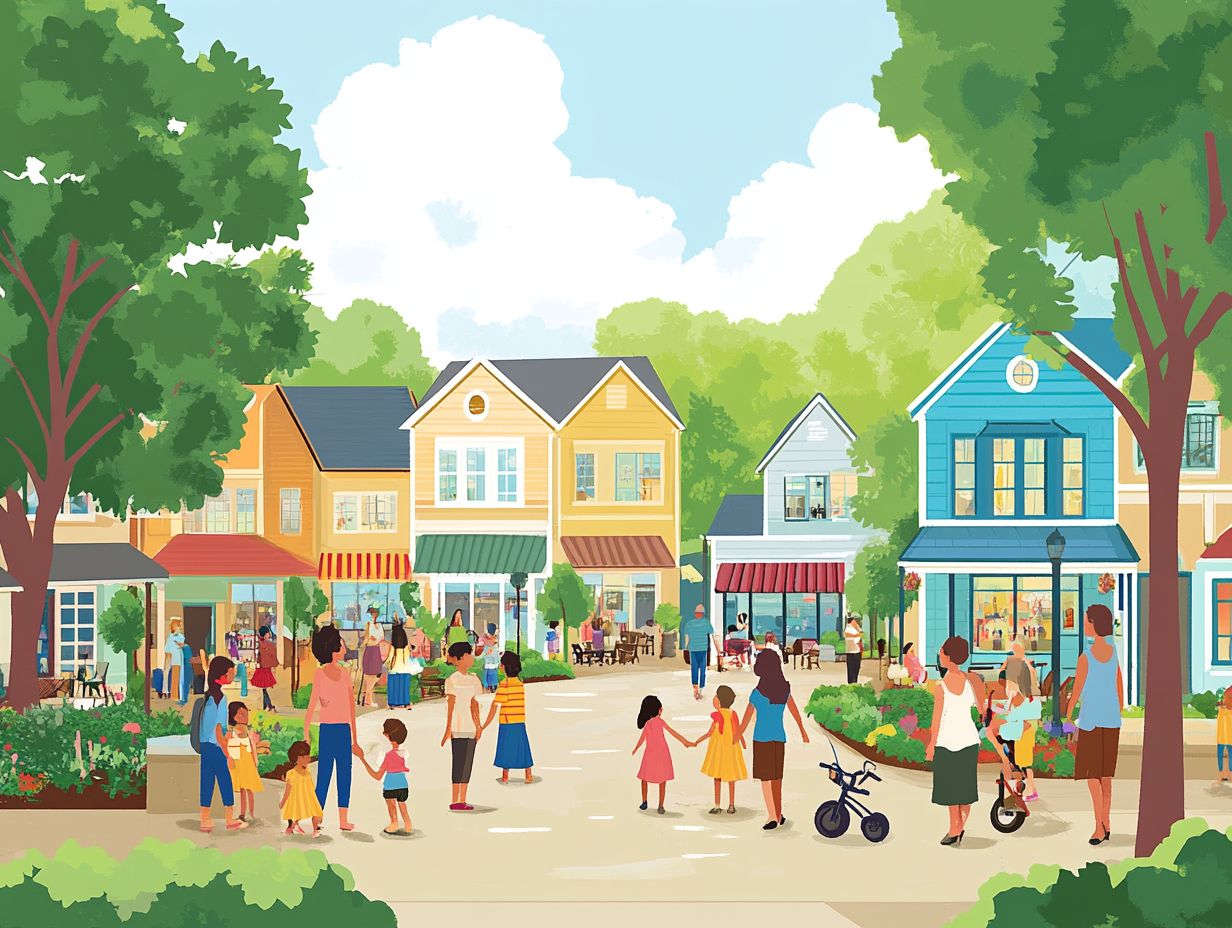
Consider location, safety, schools, and community amenities when choosing a neighborhood.
Research online and visit neighborhoods in person for the best understanding. Ask relevant questions to neighbors, local businesses, and real estate pros to make an informed decision.
Factors to Consider When Choosing a Neighborhood
Choosing the right neighborhood significantly impacts your lifestyle and homebuying journey. If you re looking for the ideal balance between safety and property values, keep these factors in mind.
Quality schools and crime rates shape neighborhoods and community pride. These elements are crucial when moving to a new area.
Lifestyle amenities and accessibility are also key. Make sure your new home fits your budget while fostering a vibrant, welcoming community.
Location and Accessibility
Location accessibility is very important. It affects your daily commute and overall lifestyle.
Being close to major transit routes means shorter commutes, giving you more free time for family and fun. Easy access to parks, grocery stores, and healthcare facilities makes daily life easier.
For instance, living near a good supermarket and school can significantly affect your household budget. Neighborhoods with great accessibility often attract families and professionals seeking comfort and affordability.
Safety and Crime Rates
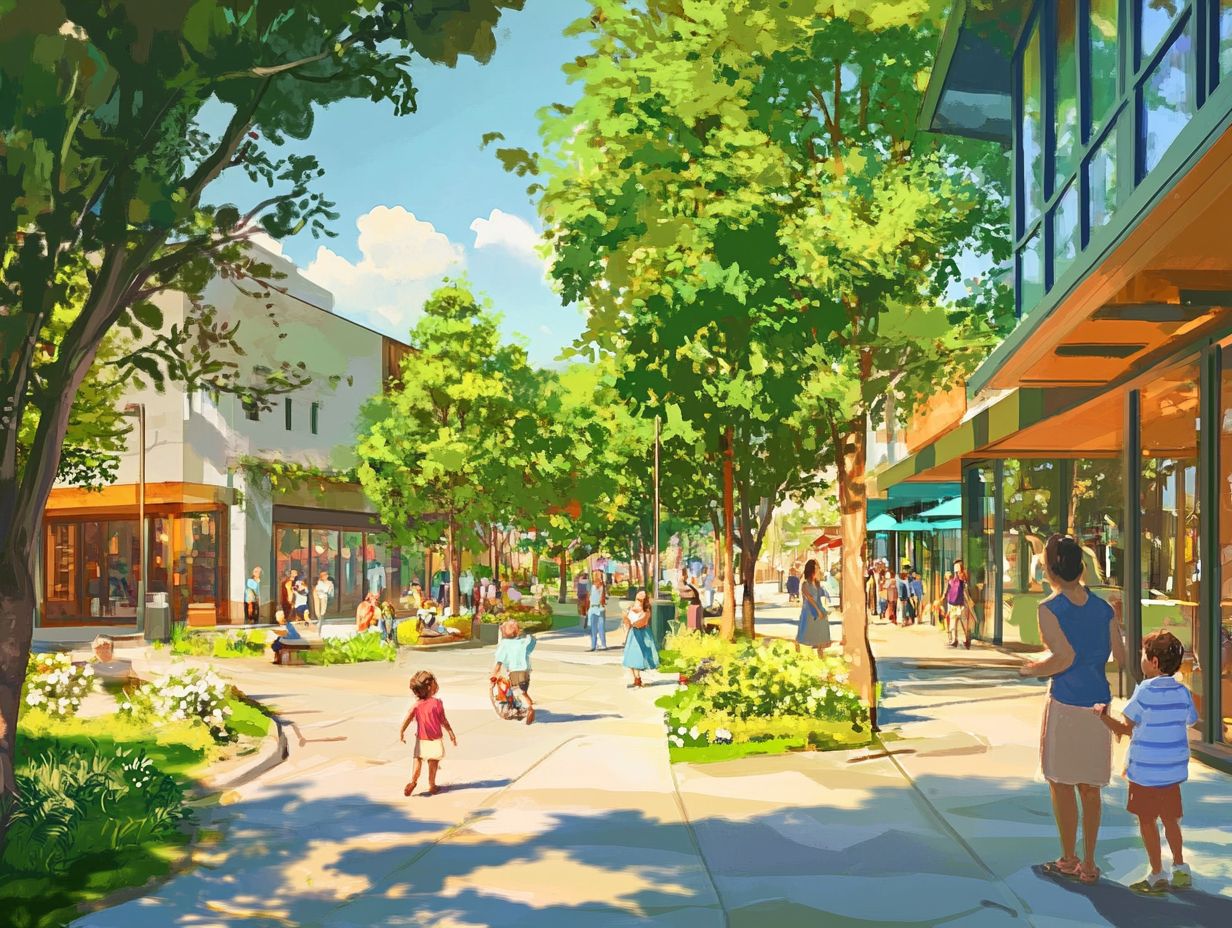
Safety is a top concern for homebuyers. Understanding crime rates and neighborhood watch programs can guide your decision.
Look into crime statistics available from local police websites or community forums. These details help you see the types and rates of crime in specific areas.
Neighborhood watch programs not only help prevent crime but also build community pride. This sense of belonging makes for a safer environment and enhances everyone s quality of life.
Start your search today and find the neighborhood that best suits your lifestyle!
School Districts and Education Opportunities
Dive into your dream home today by exploring local schools and community amenities! The quality of schools in a district can significantly influence property values and community pride. As a potential homebuyer, you likely place a high priority on educational opportunities when assessing a neighborhood.
This focus on educational excellence can profoundly shape the character of the community, fostering a sense of belonging and investment among residents. Quality schools not only draw in families but also encourage collaboration among neighbors, creating an atmosphere where parents actively participate in local activities and events.
As you embark on your quest for the perfect home, take the time to research various school districts. Look into school ratings, available resources, and extracurricular options.
Engaging with local forums or visiting schools can offer invaluable insights into the educational landscape. This ultimately helps you align your home-buying decisions with your values and aspirations for your children s future.
Community Amenities and Services
Community amenities and services are essential in shaping your lifestyle and overall satisfaction in a neighborhood. These influence everything from social connections to future developments.
Facilities like local parks, grocery stores, and recreational centers foster a sense of belonging and encourage relationships among neighbors.
Parks offer green spaces perfect for relaxation and outdoor activities, enhancing your physical well-being. Meanwhile, shopping areas add convenience and variety to your daily routine.
Recreational facilities provide opportunities for community events and sports, enriching the vibrancy of your surroundings.
When evaluating these amenities, it s important to also consider potential future developments. Planned expansions and improvements can significantly boost community engagement and attract new residents, ensuring a thriving environment for everyone involved.
Researching Potential Neighborhoods

Researching neighborhoods is a key step in buying a home. This process allows you to gather vital information about population details and local conditions with the help of skilled real estate agents and specialized research tools.
By taking the time to delve into these details, you empower yourself to make informed decisions that align with your lifestyle and preferences.
Online Resources and Local Information
Utilizing online resources like CrimeReports, SpotCrime, and GreatSchools offers invaluable insights as you navigate the homebuying journey. This is especially important when evaluating neighborhood safety and educational opportunities.
Exploring these platforms allows you to dive into various crime statistics, including the types of offenses and trends over time. This information helps you assess whether a community aligns with your safety priorities.
Examining school quality ratings helps you understand your children s educational options, as these metrics often influence property values and neighborhood desirability.
Delving into community demographics reveals crucial social aspects, such as population diversity and economic conditions, which are vital for understanding the neighborhood’s culture and overall lifestyle.
This comprehensive approach to data collection enables you to make informed decisions, ultimately leading to a more satisfying and rewarding home purchase experience.
Visiting and Exploring Neighborhoods
Visiting and exploring neighborhoods firsthand is a crucial part of your homebuying journey. It allows you to immerse yourself in the community vibe and directly assess local amenities.
Taking the time to stroll through potential neighborhoods helps you grasp day-to-day life and offers a glimpse into how residents interact and engage in local activities.
Attending community events, like farmers’ markets or festivals, can provide unique insights into what makes the area vibrant and distinctive. As you explore, jot down notes or questions that come to mind.
Connecting with local residents can reveal invaluable perspectives about the neighborhood. Engaging in conversations with those who already call the area home can uncover nuances that online research might overlook, guiding you toward a more informed and fulfilling decision.
Start exploring your future neighborhood today!
Questions to Ask When Evaluating a Neighborhood
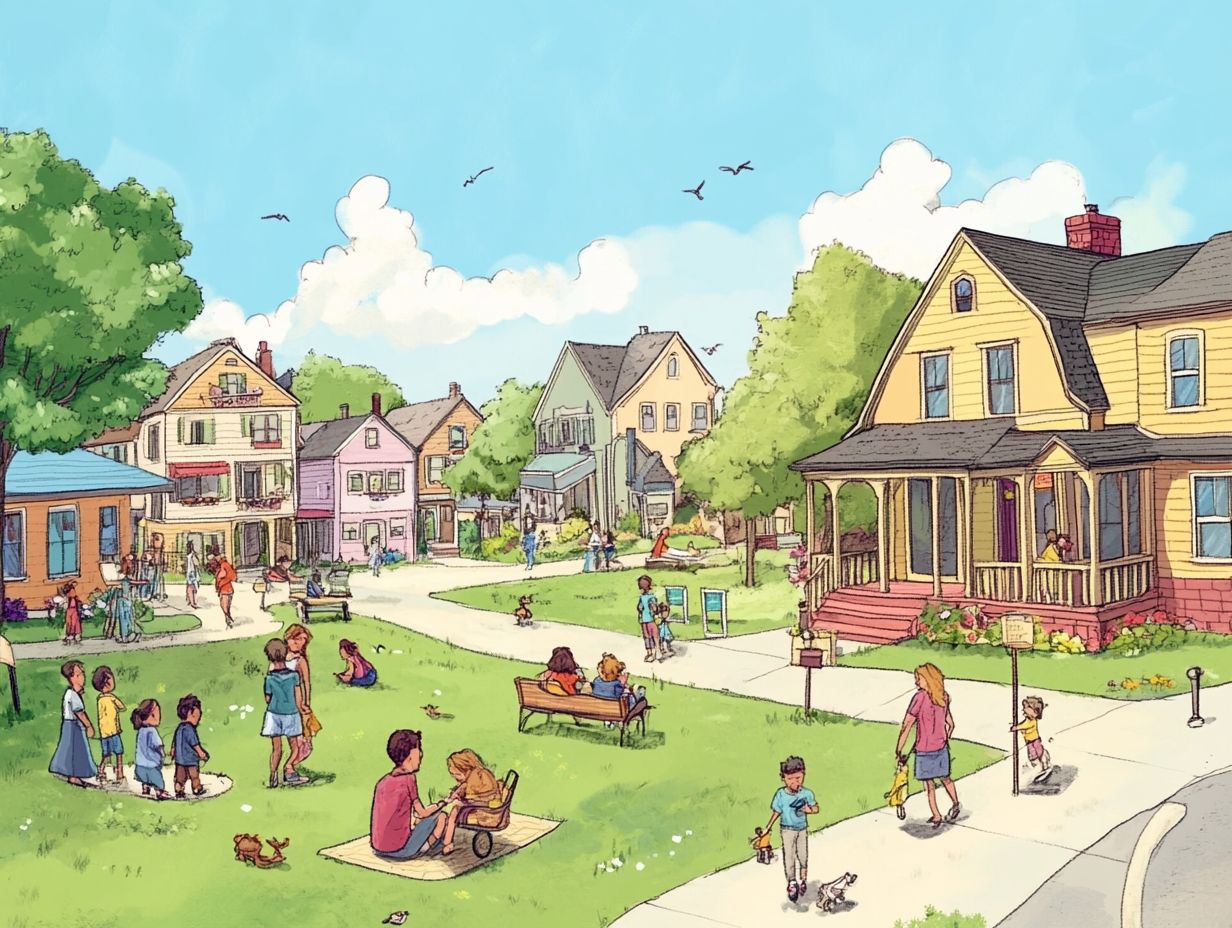
Asking the right questions when evaluating a neighborhood can illuminate its community vibe and demographics. This ultimately guides your homebuying decision toward a neighborhood that aligns with your needs.
Connect with Locals for Insight!
Engaging with your neighbors and local businesses offers invaluable insights into the community vibe. This gives you a genuine snapshot of what it s like to live in a particular area.
Participating in local events or striking up conversations with residents helps you uncover the rich social fabric that makes the community thrive. These personal connections unveil the true essence of neighborhood pride and collaborative spirit.
Attending town hall meetings or seasonal festivals can spark discussions about what sets the area apart. Topics can range from school quality to recreational opportunities. These interactions inform your homebuying decisions and foster a sense of belonging, helping you feel at home in your new community.
Questions for Real Estate Agents and Property Managers
When consulting with real estate agents and property managers, asking the right questions unlocks vital insights about property values and the current housing market. Understanding local market trends, such as pricing fluctuations and inventory levels, can significantly influence your buying decision.
Diving into neighborhood demographics helps you understand who your potential neighbors could be. This will let you know if the community resonates with your lifestyle preferences.
It s also wise to ask about upcoming developments. These can affect both your investment s value and the area s overall appeal. Analyze the agents’ responses against your personal priorities to ensure every decision nurtures a comfortable and financially sound future.
It’s Time to Make Your Final Decision!
Making the final decision in your homebuying journey requires thoughtful consideration of multiple factors. Reflecting on your housing budget is essential for your new adventure!
Each element plays a crucial role in ensuring that your new home complements your vision for the future.
Prioritizing Needs and Wants
Prioritizing your needs and wants is crucial in the homebuying process. This ensures your new home aligns with your housing budget and desired lifestyle amenities.
As you embark on this journey, take a moment to reflect on what truly matters to you. Whether it s proximity to schools, parks, or a vibrant community, make a comprehensive list of priorities.
Assess how well different neighborhoods meet these specific desires. Balancing aspirations with practical considerations like commuting distances, property taxes, and future developments is equally important.
This thoughtful evaluation leads to a satisfying home choice that offers both immediate pleasures and long-term benefits.
Considering Future Growth and Development
Considering future growth and development in the neighborhood is essential for making a long-term investment that can significantly influence property values and foster community pride.
To stay ahead of these changes, you should keep an eye on city planning meetings, keep an eye on real estate news, and watch for local developments that could bring exciting new amenities or transportation options.
Engaging with community boards, chatting with local residents, and using online tools will grant you valuable insights.
Understanding how these upcoming projects could enhance or alter neighborhood dynamics is key. Keeping an eye on the bigger picture helps you make decisions that not only satisfy your immediate needs but also ensure that your investment appreciates over time, perfectly aligning with your long-term vision for homeownership.
Frequently Asked Questions
1. How do I begin the process of choosing the right neighborhood for me?
The first step is to determine your priorities and needs. Consider factors such as your budget, transportation, school districts, and amenities you desire in a neighborhood. This will help you narrow down your options and focus your search.
2. What should I look for when exploring potential neighborhoods?
When visiting a neighborhood, pay attention to the overall appearance and upkeep of the area. Take note of the types of homes, local businesses, and any community events or attractions. It’s also a good idea to speak with local residents and get their perspective on the neighborhood.
3. How important is the location of a neighborhood?
The location can greatly impact your daily life. Consider factors such as distance from work, access to public transportation, and proximity to desired amenities. It’s also important to research the safety and crime statistics of the area.
4. What resources can I use to research potential neighborhoods?
There are many online resources available to research potential neighborhoods, such as neighborhood review websites, crime maps (maps showing crime incidences), and school district rankings. You can also speak with a local real estate agent who can provide valuable insights and information about the area.
5. Should I consider the potential for future development in a neighborhood?
Yes, it’s always a good idea to consider the potential for future development in a neighborhood. This could greatly impact property values and the overall atmosphere of the area. Look for signs of current or planned developments and consider how they may affect your quality of life.
6. Is it important to involve my family in the decision of choosing a neighborhood?
Yes, it’s important to involve your family in the decision, especially if you have children. Consider their needs and preferences, such as access to good schools, parks, and other family-friendly amenities. It’s also a good idea to visit potential neighborhoods together to get everyone’s input and make the decision as a family.
Start your neighborhood research today and make an informed decision!

